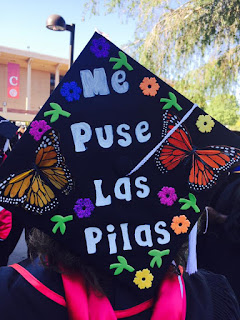One of these mornings you're gonna rise up singing
And you'll spread your wings and you'll take to the sky...
So hush, little baby, don't you cry
Every summer I get to indulge in lots of reading.
There are usually a stack of books on my nightstand.
They aren't just an escape. They don't just teach me everything I know.
My mom used to say that my mother was my books (tu madre, los libros).
That sounds about accurate.
For most of us, the go-to mother/drug/soother in good times and in bad is alcohol (or sex, porn, shopping, food, work, social media, and so on) because it's there when you need it and the results are reliable and consistent, until you need more and more to get the same high.
My high from reading is pretty intense. I get vivid visions and make connections that solve problems big and small. I get transported and lose track of time. Summer reading is when I am likely to stay up all night to finish the novel I just can't put down. Summer is also when I tend to read novels, because normally I'm a non-fiction kinda gal.
Right now, I am engrossed in a book called, "The World Until Yesterday." Here are some excerpts:
- All human societies have been traditional for far longer than any society has been modern.
- Traditional societies in effect represent thousands of natural experiments in how to construct a human society. They have come up with thousands of solutions to human problems, solutions different from those adopted by our own WEIRD (Western, educated, industrialized, rich and democratic) modern societies...some of those solutions - for instance, some of the ways in which traditional societies raise their children, treat their elderly, remain healthy, talk, spend their leisure time, and settle disputes - may strike you, as they do me, as superior to normal practices in the First World. Perhaps we could benefit by selectively adopting some of those traditional practices. Some of us already do so, with demonstrated benefits to our health and happiness. In some respects we moderns are misfits; our bodies and our practices now face conditions different from those under which they evolved, and to which they became adapted.
- ...changes among societies can be reversed.
- Within a generation or two, and within the individual lives of many people...New Guinea Highlanders learned to write, use computers, and fly airplanes...the New Guinea Highlands of 1931 lacked writing, metal, money, schools and centralized government. If we hadn't actually had recent history to tell us the result, we might have wondered: could a society without writing really master it within a single generation?...All of those differences between the 2006 and 1931 crowds can be summed up by saying that, in the last 75 years, the New Guinea Highland population has raced through changes that took thousands of years to unfold in much of the rest of the world...Thus, New Guinea is in some respects a window onto the human world as it was until a mere yesterday, measured against a time scale of the 6,000,000 years of human evolution...All those changes that came to the Highlands in the last 75 years have also come to other societies throughout the world, but in much of the rest of the world those changes appeared earlier and much more gradually than in New Guinea. 'Gradual,' however, is relative: even in those societies where the changes appeared first, their time depth of less than 11,000 years is still minuscule in comparison with 6,000,000 years. Basically, our human societies have undergone profound changes recently and rapidly.
What's cool about this blog is that I started it in 2009 and it contains most of the important lecture notes, article and book excerpts that have made an impact on my thinking. When I have to write something and think, "where is that article about this thing I'm trying to write about?" all I gotta do is search this blog. It's like a back up and extension of my brain. So handy.












